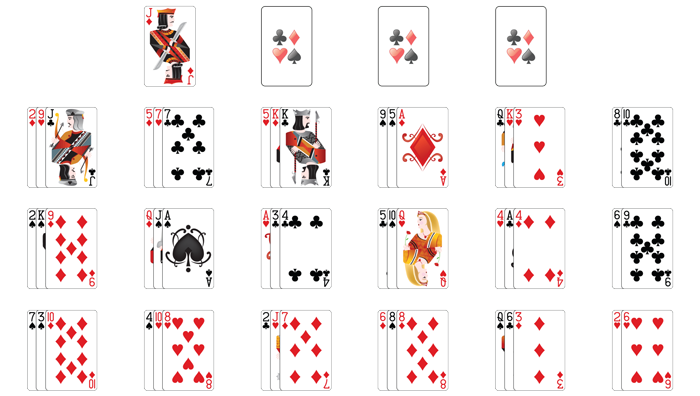This solitaire game is quite interesting as it requires more skill than luck. The cards are divided into 13 piles, a baker's dozen number.
The objective is to move all cards to the foundations in ascending order in suit using as few moves as possible.
The expression "baker's dozen" comes from the 13th century, when King Henry III of England enacted a law that regulated the production of food, more specifically, bread and beer.
At the time it was common for people to buy a dozen loaves of bread. As the law provided for severe punishments for bakers who did not supply the loaves in the quantity and quality required by the law, they began to supply an extra loaf for every dozen, that is, 13 loaves instead of a dozen. This became known as the "baker's dozen".
The game was created by dividing the deck into 13 parts (the full deck has 52 cards and is therefore divisible by 13) of 4 cards each. Thus, the number of piles was associated with the story of the "baker's dozen".
After the cards are dealt, the Kings are repositioned to the bottom of their respective piles. This is because the piles are arranged in descending order and empty spaces cannot be used, unlike Klondike, which allows you to place a King, and Spider Solitaire, which allows any card to be placed in an empty space.

Challenge yourself in a solitaire game that requires skill and luck.

Bear River Solitaire is a unique solitaire game that requires a lot of thinking to complete.

Test your skills with Freecell. Play the classic game of strategic patience.

Solitaire game in which each card is considered a flower and it takes skill to win.
Solitaire, a game often seen as a simple diversion, holds within its ordered world a profound lesson in mindfulness and the art of delayed gratification. The solitary nature of the game encourages a player to be fully present in the moment, focusing on the cards, the possible moves, and the strategies to be employed. This singular concentration fosters a state of mindfulness, where external distractions fade away, allowing the player to engage in a form of active meditation. The rhythmic pattern of sorting and organizing the cards becomes a practice in patience and attentiveness, as one must remain aware of the present game state while also anticipating future moves. In this way, Solitaire trains the mind to be observant and deliberate, qualities that are essential for mindfulness.
Furthermore, Solitaire is not a game of instant rewards; it teaches players the value of delayed gratification. Unlike fast-paced games that offer immediate rewards and constant stimulation, Solitaire requires a player to work through the deck patiently, with the understanding that success may not be immediate. This pacing ensures that when victory comes, it is the result of persistence and the ability to delay the desire for an immediate outcome. In a world that often prioritizes instant gratification, Solitaire stands out as a bastion for the slower, more rewarding experience. It instills in players the understanding that some rewards are worth the wait, and that the satisfaction derived from achieving a goal is heightened by the effort and time invested in reaching it.
Solitaire, a game often associated with leisurely pastime, has found its place as a cogent tool in the arsenal for promoting elderly brain health. As individuals age, the importance of maintaining cognitive agility becomes paramount, and Solitaire offers a readily accessible means to engage the brain in a range of mental exercises. The game's requirement for pattern recognition, strategic planning, and memory recall exercises key areas of the brain involved in cognitive preservation. Regular engagement in Solitaire can help older adults keep their minds sharp, potentially staving off the cognitive decline that can accompany aging. It's not just about moving cards, but rather about stimulating neural pathways, enhancing mental speed, and preserving the brain's plasticity, which are crucial for sustaining a high quality of cognitive function in the later years of life.
Moreover, Solitaire's inherent flexibility as a game that can be played both traditionally with cards or digitally on various devices adds to its appeal for the elderly, offering a comfortable and familiar interface to engage with technology. This intersection of traditional game mechanics with modern technology not only bridges generational gaps but also encourages a form of mental training that is both effective and enjoyable. The simplicity of Solitaire, requiring no complex rules or physical exertion, makes it an ideal brain exercise for the elderly, providing a gentle yet effective workout for the mind. By regularly arranging decks, sequencing suits, and solving layouts, elderly players can sharpen their mental faculties, potentially enhancing their daily functioning and prolonging their cognitive health.